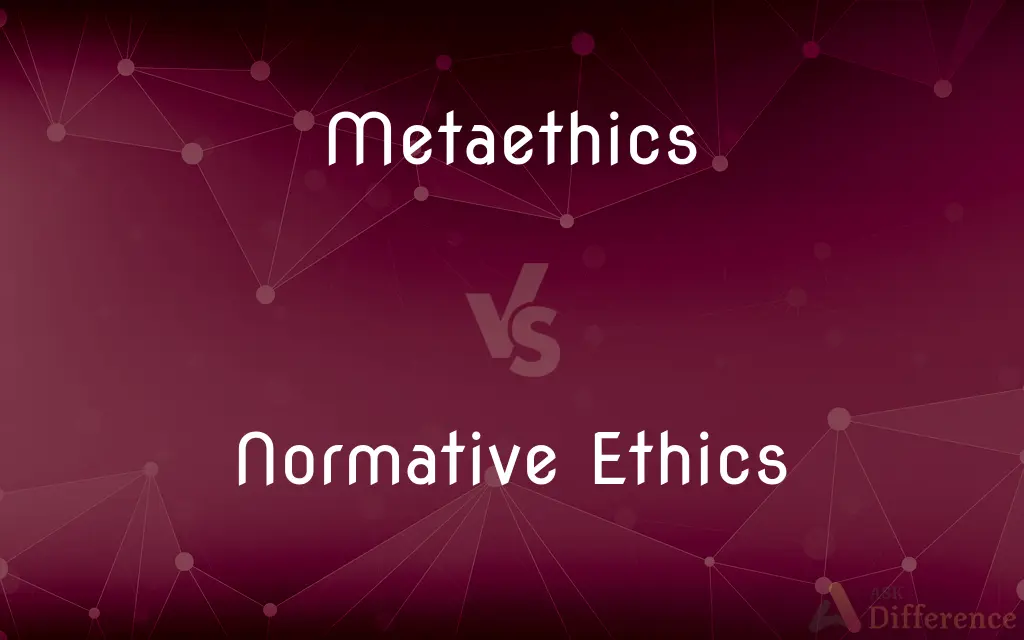Metaethics vs. Normative Ethics — What's the Difference?
Edited by Tayyaba Rehman — By Fiza Rafique — Published on December 27, 2023
Metaethics explores the nature and origin of ethical concepts, while Normative Ethics provides guidelines on how one should act morally.

Difference Between Metaethics and Normative Ethics
Table of Contents
ADVERTISEMENT
Key Differences
Metaethics delves deep into the philosophical understanding of ethics. It doesn't provide moral guidelines or rules but instead questions what morality is, its origins, and what constitutes ethical language. For instance, Metaethics asks if there are objective moral truths or if morality is subjective. On the other hand, Normative Ethics is concerned with the practical aspect of morality. It provides a framework or set of guidelines about what actions are right or wrong. Essentially, while Metaethics debates the meaning of "good," Normative Ethics outlines what one should do to be "good."
While Metaethics might query the nature of moral judgments, Normative Ethics would provide the moral judgments themselves. If Metaethics raises questions like "What does 'good' mean?", Normative Ethics would answer with "This action is good because...". It's a distinction between understanding moral language and constructing moral systems.
Normative Ethics can often be seen in various ethical theories like utilitarianism, which proposes actions that maximize happiness are moral. Metaethics, however, would probe deeper, asking foundational questions about the nature of happiness and the objectivity of utilitarian principles. Therefore, while Normative Ethics offers action-guiding principles, Metaethics grapples with the very essence and foundation of those principles.
In summary, while both Metaethics and Normative Ethics address moral questions, their scopes differ. Metaethics delves into the fundamental nature of morality, ethics, and their conceptual framework, whereas Normative Ethics is concerned with determining general principles to distinguish right actions from wrong ones.
Comparison Chart
Focus
Nature and origin of ethical concepts
Guidelines on moral actions
ADVERTISEMENT
Provides Moral Guidelines
No
Yes
Questions/Deals With
Meaning of ethical terms
Determining right and wrong actions
Examples
Debate on moral relativism
Utilitarianism, deontology
Application in Real Life
Analyzing moral language and its foundation
Making decisions based on moral principles
Compare with Definitions
Metaethics
Analyzes the origin of moral values.
Metaethics delves into whether moral values are innate or socially learned.
Normative Ethics
Provides guidelines for moral actions.
Normative Ethics might argue that lying is wrong because it erodes trust.
Metaethics
Questions the semantics of moral language.
Metaethics investigates what we mean when we label an action as wrong.
Normative Ethics
Offers moral frameworks and theories.
Utilitarianism, which focuses on maximizing happiness, is a branch of Normative Ethics.
Metaethics
Deals with meta-level moral understanding.
Instead of deciding on right actions, Metaethics contemplates the very concept of rightness.
Normative Ethics
Addresses general moral principles.
Normative Ethics would propose principles like One should not harm others.
Metaethics
Probes the objectivity or subjectivity of ethics.
Metaethics discusses if morality is a human-made concept or exists independently.
Normative Ethics
Applies ethics in real-world scenarios.
Using Normative Ethics, one can judge the morality of stealing to feed a starving child.
Metaethics
Concerns the nature of ethical properties.
Metaethics debates whether goodness is a universal truth or a cultural construct.
Normative Ethics
Concerns determining what's right or wrong.
Under Normative Ethics, one might evaluate the ethics of capital punishment.
Metaethics
The study of the meaning and nature of ethical terms, judgments, and arguments.
Metaethics
(ethics) The study of the nature and meaning of moral judgments, and the foundations and the possibility of ethical reasoning as such.
Common Curiosities
How does Normative Ethics guide us?
It provides guidelines on how one should act morally.
What does Metaethics study?
It studies the nature, origin, and meaning of ethical concepts.
Which one provides moral theories: Metaethics or Normative Ethics?
Normative Ethics offers moral theories like utilitarianism and deontology.
Can you give an example of a Metaethics question?
"What does it mean for something to be morally 'right'?"
What's a typical question in Normative Ethics?
"Is it morally acceptable to lie in order to protect someone's feelings?"
Do Metaethics and Normative Ethics overlap?
While they address different aspects of morality, discussions in one can influence the other.
Is Metaethics concerned with right or wrong actions?
No, it's more about understanding the foundation and concept of morality.
Why is Metaethics important?
It helps clarify and understand the foundational aspects of morality and ethical language.
Is Metaethics subjective or objective?
Metaethics debates that very question: whether morality is subjective or objective.
Does Normative Ethics provide moral answers?
Yes, it offers guidelines and principles to determine what actions are morally right or wrong.
How is Normative Ethics applied in daily life?
It guides individuals in making moral choices and judgments.
Which one is more abstract: Metaethics or Normative Ethics?
Metaethics is more abstract as it deals with the conceptual foundation of ethics.
Which is more practical in everyday scenarios: Metaethics or Normative Ethics?
Normative Ethics, as it provides action-guiding moral principles.
Can Normative Ethics exist without Metaethics?
While they can be studied independently, Metaethics provides the foundational understanding for Normative Ethics.
How do philosophers use Metaethics?
They use it to debate and understand the fundamental nature and origin of moral concepts.
Share Your Discovery

Previous Comparison
Mexican Mafia vs. Mexican Cartel
Next Comparison
2G Network Technology vs. 3G Network TechnologyAuthor Spotlight
Written by
Fiza RafiqueFiza Rafique is a skilled content writer at AskDifference.com, where she meticulously refines and enhances written pieces. Drawing from her vast editorial expertise, Fiza ensures clarity, accuracy, and precision in every article. Passionate about language, she continually seeks to elevate the quality of content for readers worldwide.
Edited by
Tayyaba RehmanTayyaba Rehman is a distinguished writer, currently serving as a primary contributor to askdifference.com. As a researcher in semantics and etymology, Tayyaba's passion for the complexity of languages and their distinctions has found a perfect home on the platform. Tayyaba delves into the intricacies of language, distinguishing between commonly confused words and phrases, thereby providing clarity for readers worldwide.
















































